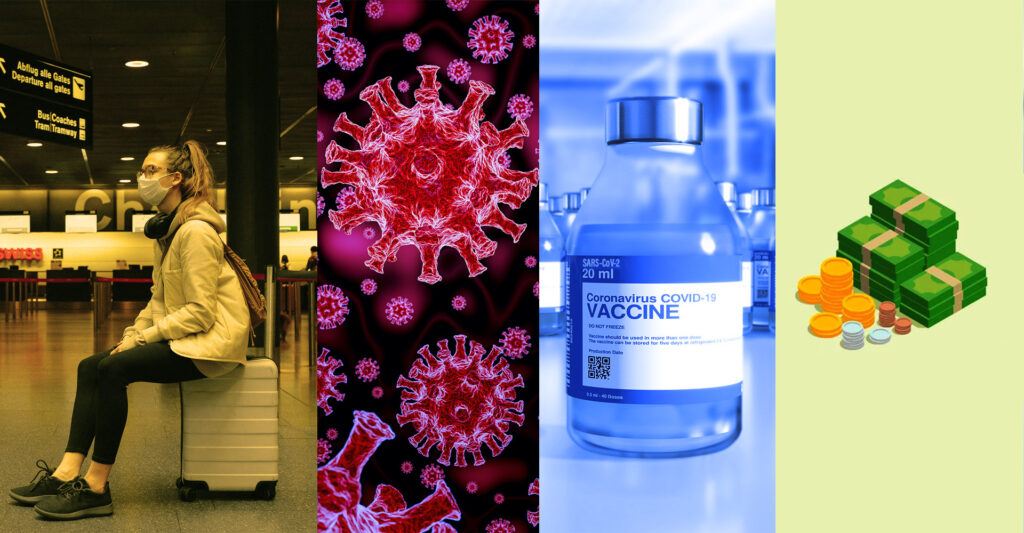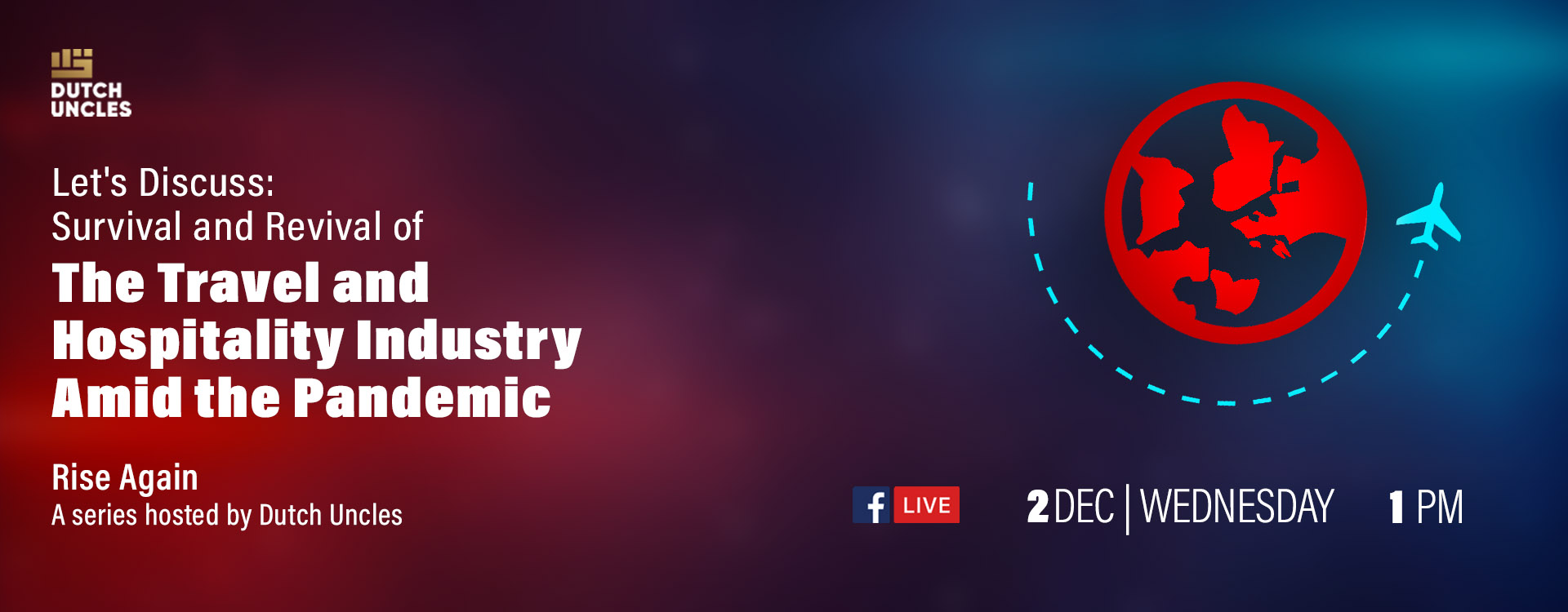A live panel discussion hosted by Dutch Uncles on the ‘Survival and Revival of the Travel and Hospitality Industry Amid the Pandemic’ as part of the ‘Rise Again’ series. Panellists: Ashish Kumar, Co-chairman of FICCI Travel and Technology Committee; Jyoti Mayal, President of the Travel Agents Association of India and the Chairperson of Tourism and Hospitality Skill Council under the aegis of National Skill Development Corporation (NSDC); Anshu Bhatia, Founder of ABR Hospitality; Saurab Saluja, Entrepreneur at Global E-Commerce and moderated by Sapna Bhardwaj, Editor-in-Chief of Dutch Uncles.
Coronavirus, otherwise known as COVID-19, first made its way onto the global stage way back in December of 2019. Back then it was considered as perhaps just another isolated incident of a viral outbreak, one which would be culled within a few days and within the bounds of the country it originated. Perhaps that was the first mistake – underestimating the magnitude of the virus. Within three months of the first reported cases, the countries of the world were clutching at straws to keep the order and to prevent further spread of the virus, which had by then been dubbed a pandemic.
In the initial days of the lockdown, we expected it to be perhaps just a few weeks indoors, maybe a month at most. What no one could have anticipated was that the world would still be fighting COVID-19 a year later! The impact of the virus not only took a toll on our socialisation but also surpassed all expectations in bleeding the economy dry, costing millions of people their jobs and ravaging the industries of the world.
One of the worst-hit industries were tourism, travel and hospitality. The tourism industry in Asia took the brunt of the impact as statistics from the World Travel and Tourism Council (WTTC) indicate that the region saw well over 60 million job losses by the month of April itself. The WTTC projected an estimate of over 100 million job losses by the end of 2020 in the industry and an estimated loss of over $2.7 trillion. When you consider that the travel and tourism industry accounts for over 10 percent of the global GDP, the true scale of loss is evident.
‘‘
The government has not been giving us any relief and it is on us to independently take our stance to support ourselves.
- Anshu Bhatia

How The Industry Is Going To Survive
According to Ms. Jyoti Mayal, President of the Travel Agents Association of India (TAAI), The tourism industry, especially the Indian sector, she feels is a very resilient one. She attributes the potential revival to the level of dedication people have towards reviving their livelihoods and the innate desire in all of us to travel – human nature if you will.
“We are a resilient industry and we will come back much quicker because we are a youth country, firstly, and we know how to survive. That is the first thing that goes very positive for India. Because the youth is all out to start working immediately and we have all the brains here and I’m sure it will happen. But it is a pandemic here which no one really knew would happen, so everyone is taking baby steps right now,” said Ms. Mayal.
This is very true in a way. Travelling is more than just an activity for leisure, it is a part of human nature to be curious, to explore and expand. That is why there is a tourism industry in the first place. Regardless of the dormant state, it is in now, it is an inevitable outcome that people will find ways to travel safely; as the old saying goes, “where there is a will there’s a way.”
When Dutch Uncles spoke to Mr. Saurabh Saluja, an Entrepreneur at Global E-Commerce, he said, “this is a challenging time but let us understand one very simple thing and that is travel is not only industry. For a lot of people, travelling is a dream. Travel is something that has always been there. The industry will definitely revive. What we can see from a direct selling industry standpoint, is that this industry will help the travel industry move fast, from a revival perspective.”
In order to give the tourism industry a good shot at survival and revival going forward, the panel of experts Dutch Uncles spoke to highlighted the following areas as crucial:
There needs to be a steady stream of revenue and a reliable pipeline to supply that revenue to keep things open and functioning.
Government aid relief is also much needed but it is purely a secondary resort and only temporary at that because, without a reliable and steady revenue pipeline, the relief packages simply act as crutches. Revenue will give the industry its own feet to stand on.
The government needs to put better operational strategies and industry policies in place in the event of a potential future calamity.
Technology and digital platforms need to be put to use in a better manner at the ground level.
There is also a need for a unified platform where those who work on the ground-level, directly with the tourists and travellers on a day-to-day basis, can voice concerns and suggest changes. Most often they are the first ones to notice the change.
Why Did It Hit The Industry So Hard?
According to the Co-Chairman of FICCI Travel and Technology Committee, Mr. Ashish Kumar, one of the main reasons that the industry was hit so hard was because the revenue pipeline dried up.
“So, if you look at it, strategically, it is over a pipeline of three months in various countries, the travel, tourism, hospitality industries saw the revenue drying up slowly and suddenly.
If you equate it to the flow of water, be it a dam, river or well, if the water dries up, suddenly you feel an impact of that water being dried up. So, the first reaction to that water being dried up, which is the revenue, in this case, was cost.” said Mr Kumar. It goes back to the old adage, “You do not know what you have until it is gone.”
The tourism sector, being such a large beast of an industry, sat comfortably where it was and there was very little in terms of backup funds. Another contributing factor is the technology that the industry so heavily relies on.
The digital realm made for an easy, affordable and quick travel and tourism experience, be it in the form of bookings, contacting agents, buying tickets or cancellation. All of which were fuelled by the trips we take and the money we spend through that vast interconnected network – a network that collapses when the people who fuel it are expected to stay put in one place for over a year. As Mr. Kumar puts it “We have had the carpet pulled out from under us.”
The major concerns now, even with the arrival of vaccines, are cash flow and safety. Though avenues will eventually open up to tourists and people will have the option to travel again, the industry may not see a revival in the immediate future. For one, with all the job losses, people are struggling to sustain their domestic livelihoods, which puts leisure travel out of the question. Secondly, even with the vaccine, widespread usage is limited and the effectiveness of the vaccine does not outweigh the risks of contracting COVID-19. With experts the world-over saying that the virus is not going anywhere anytime soon, it does not do a whole lot to inspire confidence for the average traveller.
Impact On International Travel
Airlines and cruise ships have become somewhat of poster children for the tourism industry amidst the pandemic. International air carrier groups like Delta and United Airlines had all but two months of reserve funds to cover expenses according to the International Air Transport Association (IATA). Cruise ships faced a different challenge altogether as they had to spend weeks if not months at sea because they were carrying passengers infected by COVID-19. In April of this year, IATA estimated a loss of $252 billion for the global air transport sector.
Cruise ships companies, by the same time, had lost well over $750 million in revenue and the big players like Royal Caribbean and Norwegian saw a drop in shares by approximately 70 per cent.

Impact On The Hospitality Industry
On the other end of the spectrum, hotels all over the world were also impacted by the lockdown with clients making cancellations on a scale never before seen. So much so that franchise giants such as the Marriott and the Hilton have had to furlough a large percentage of their employees. The average daily rate for a hotel room was not even close to the break-even needed to turn a profit.
For example, in the US, mid-tier, economy and upper mid-tier hotels saw the brunt of it with as much as a 10 per cent drop in the revenue per room. In terms of the most affected segments as per location, the small-town, interstate, suburban and resort sectors were the localities most affected.
When speaking to the Founder of ABR Hospitality, Mr. Anshu Bhatia, he re-emphasised the point of how badly local hotels and even his own business has suffered in the pandemic. “If we talk about the current scenario, there is no survivor of the hotel trade as of now. We are not even able to meet 10 per cent occupancy of the hotel. It is a challenge to even meet the daily expenses to maintain hotel operations.”
In early March there were signs of hope for the revival of the hotel industry in Mainland China – ground zero. According to Bloomberg, the hotel bookings saw a rise in almost 40 per cent as the country declared that the outbreak was under control. Regardless of a second or third wave, this transformation shows us that recovery is possible, even in such dire times. This brings us to the next point:




